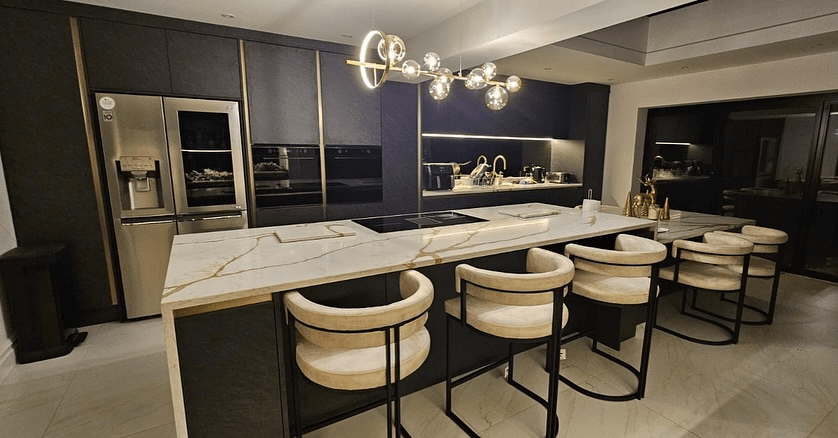If you’re planning a new kitchen or bathroom, one of the biggest choices you’ll face is what type of worktop to go for. Two popular options are quartz and luxury laminate. On the surface, laminate can look appealing because of its lower price point, but quartz is often the go-to for those who want a premium, long-lasting finish.
At LM Stone Creative Ltd, we supply and install bespoke quartz worktops across the UK, so we know exactly what makes them stand out. Let’s break down the pros and cons of quartz vs luxury laminate to help you decide which one is right for you.
Table of Contents
What Is Quartz?
Quartz worktops are engineered stone surfaces, made from natural quartz crystals blended with resin. The result is a strong, durable material that comes in a huge range of colours and finishes. Quartz combines the beauty of natural stone with the consistency of a man-made product, making it one of the most popular worktop choices in the UK.

What Is Luxury Laminate?
Luxury laminate worktops are made from layers of paper and resin bonded together, then topped with a decorative printed layer that mimics stone, wood, or other textures. They’re lightweight, cost-effective, and come in a variety of looks — but they don’t have the same strength or longevity as stone.
Quartz vs Luxury Laminate: The Comparison
. Durability
-
Quartz: Extremely strong, resistant to scratches, chips, and stains. With proper care, quartz can last decades.
-
Laminate: More prone to scratches, heat damage, and moisture issues over time. It’s not as tough for heavy-use kitchens.
2. Appearance
-
Quartz: Offers a premium, natural-looking finish. Every slab is unique, with options that range from sleek modern tones to dramatic marble-effect patterns.
-
Laminate: Can look good at first glance, but it’s essentially a printed surface. Up close, it doesn’t have the depth, texture, or luxury feel of real stone.
3. Maintenance
-
Quartz: Very easy to maintain — no sealing required. Just wipe clean with warm, soapy water.
-
Laminate: Low-maintenance too, but once it’s damaged, it’s difficult (or impossible) to repair.
4. Cost
-
Quartz: More expensive upfront, but it’s an investment that pays off in durability and resale value.
-
Laminate: Cheaper initially, which can make it tempting if you’re on a tight budget. However, it may need replacing much sooner.
Value to Your Home
-
Quartz: Adds real value to your property. A custom quartz worktop is often seen as a premium feature by buyers.
-
Laminate: Looks fine but won’t significantly boost your home’s resale appeal.

Which Should You Choose?
If budget is your main concern, laminate might work as a short-term solution. But if you want something that’s going to last, look incredible, and add value to your home, quartz is the clear winner.
At LM Stone Creative Ltd, we specialise in creating bespoke quartz worktops across the UK — We’ve helped homeowners, designers, and architects achieve everything from sleek modern kitchens to classic, timeless spaces.
If you’re weighing up quartz against luxury laminate, the choice really depends on how you see your kitchen or bathroom in the long run. Laminate can work as a quick fix, but if you want something that feels premium, lasts for years, and adds real value to your home, quartz is the smarter investment.
At LM Stone Creative Ltd, we supply and install bespoke quartz worktops across the UK — from Cheshire and Manchester to Liverpool, Stockport, and beyond. Wherever you are, our team makes it easy to bring the durability and elegance of quartz into your home.

Looking for more expert tips on caring for your worktops? Keep an eye out for more articles—practical and real-life advice is on the way.
We’d love to hear from you! Got a method that’s worked wonders for you, or a lesson you’ve picked up along the way? Share your worktop story in the comments below (and yes, we really do read them)

